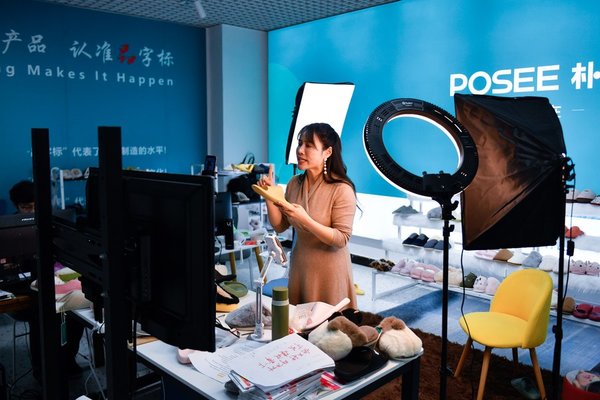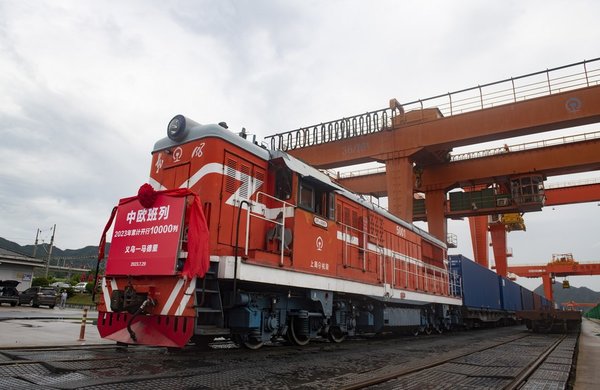(BRF2023) Feature: BRI Unleashes 'She' Power in Cooperation, Common Development
 |
| Click the photo and watch the video. |
Anketsebrhan Girma, Ethiopia's first woman electric train driver, honed her expertise in China. Meanwhile, Joelle Zita Bolabola's TV programs have been instrumental in fostering cultural understanding between Africa and China, while Meerzat Omuralieva's flourishing jewelry business owes its success to the high-quality products of China and the transformative impact of the Belt and Road Initiative.
BEIJING, Oct. 20 (Xinhua) — In front of the control panel, a woman locomotive driver from Ethiopia is attentively operating an electric train in a driving simulation in the central Chinese city of Zhengzhou.
Despite her slender stature, Anketsebrhan Girma exhibits remarkable competence, deftly managing the controls with agile and skillful movements as she maintains an unwavering focus. On the screen, the image shows the train gliding smoothly along the tracks.
After university, Girma overcame daunting odds to become Ethiopia's first woman electric train driver. The railway was foreign to Ethiopia, and the prospect of becoming a train driver seemed unattainable for Girma.
"The operation is hard for me. Not only for me but also for all the others," said Girma, who began a six-month training program in July in Zhengzhou, far from home.
"The first time I saw a real train up close, I was both awestruck by the colossal machine and a bit fearful," Girma described. After receiving diligent study and hands-on guidance from Chinese instructors, Girma and the other trainees can now confidently command the controls.
With the opening of the Addis Ababa-Djibouti Railway, Ethiopia now has a vital rail connection to the sea, reducing the transport time for goods from three to seven days to less than a day.
This electric transboundary railway is a first in Africa, a flagship project under the Belt and Road Initiative (BRI).
In addition, Girma said the railway serves as a "backbone" for Ethiopian youth and women with limited education to work and make a living.
On the eve of China's National Day this year, Girma took a high-speed train to Beijing for the first time. She was amazed by the fast and smooth ride. "I will work hard to learn the technology and hope that one day, I can also drive advanced trains in Ethiopia."
The Addis Ababa-Djibouti Railway is a significant node of the BRI, which is celebrating its 10th anniversary this year. The initiative has always taken a people-centered approach, focusing on poverty eradication, job creation and improving people's well-being to ensure that the benefits of cooperation reach all individuals.
 |
| Staff members go about their work during the arrival of the first shipment of trucks at the Indode Freight Station on the outskirts of Addis Ababa, capital of Ethiopia, on May 24, 2023. [Xinhua/Michael Tewelde] |
Building a Bridge
Joelle Zita Bolabola from Gabon stands passionately in front of a microphone, delivering lines destined to reach African audiences.
"I never get bored or tired because I do what I love. TV shows give me a better understanding of the different cultures in Africa and the world," said Bolabola, who worked as a host and voice actress at StarTimes, a Beijing-based media group.
Working in this field after graduation, Bolabola has been hosting more than six popular programs various from fashion, TV series, and cultural exchanges. Her programs showcase Chinese and African culture and society to global viewers through StarTimes' TV signal and cover the entire African continent.
Currently, StarTimes is striving to promote its digital TV services in rural areas in Africa, as part of its effort to carry out the "Access to Satellite TV for 10,000 African Villages" project initiated by China in 2015 to bridge the digital gap and reinforce mutual understanding under the framework of the BRI.
Bolabola is most proud that her shows can reach her compatriots. "My dad has also watched and praised the shows I've hosted," she said with pride. "If African viewers see a host from Africa, someone with the same skin color, they feel a stronger connection."
Bolabola hopes that her shows, serving as a bridge for the African and Chinese people to learn more about each other, can help her African viewers know more about the real China, especially how Chinese society offers more developmental opportunities for women, since people-to-people exchanges are the social foundations of BRI cooperation.
"I observe their development, and I find it really interesting, don't you? When you see how others are developing, you can learn."
Realizing a Dream
"What's on your list today?" a vendor at the wholesale market complex in China's Yiwu city asked Meerzat Omuralieva, a 31-year-old woman from Kyrgyzstan with a jewelry business in China.
Omuralieva's artistic eye allows her to skillfully capture the intricate details and reflections of the delicate gems that adorn various accessories. She demonstrates a commitment to understanding each product's unique qualities and determining its market value.
 |
| A host introduces products on live broadcasting in Yiwu, east China's Zhejiang Province, Feb. 8, 2021. [Xinhua/Huang Zongzhi] |
"High-quality Chinese products are in high demand overseas," Omuralieva said. "Last year, we shipped 30 containers through China-Europe freight train. This year, we've also had many air shipments, sending goods daily by air to Ukraine, Mexico and France," she said.
Omuralieva's goods depart from Yiwu and eventually reach their destination through the China-Europe freight train, transporting goods to many countries that join the BRI. According to statistics, as of the end of June this year, the China-Europe freight train has made a total of 74,000 trips, transporting nearly 7 million containers, with a total cargo value exceeding 300 billion U.S. dollars.
 |
| A China-Europe freight train departs from a railway station in Yiwu, east China's Zhejiang Province, July 29, 2023. [Photo by Shi Kuanbing/Xinhua] |
Omuralieva believes jewelry is a product category in perpetual demand. Her aesthetic taste has guided her to source various kinds of jewelry in China that meet the needs of her women customers worldwide.
"Initially, I considered starting a business in China as a dream, but now, I have realized that dream and expanded my business to a growing number of countries worldwide. Following the Belt and Road, my business has been thriving," Omuralieva said.
(Source: Xinhua)
Please understand that womenofchina.cn,a non-profit, information-communication website, cannot reach every writer before using articles and images. For copyright issues, please contact us by emailing: website@womenofchina.cn. The articles published and opinions expressed on this website represent the opinions of writers and are not necessarily shared by womenofchina.cn.








.jpg)

 WeChat
WeChat Weibo
Weibo 京公网安备 11010102004314号
京公网安备 11010102004314号